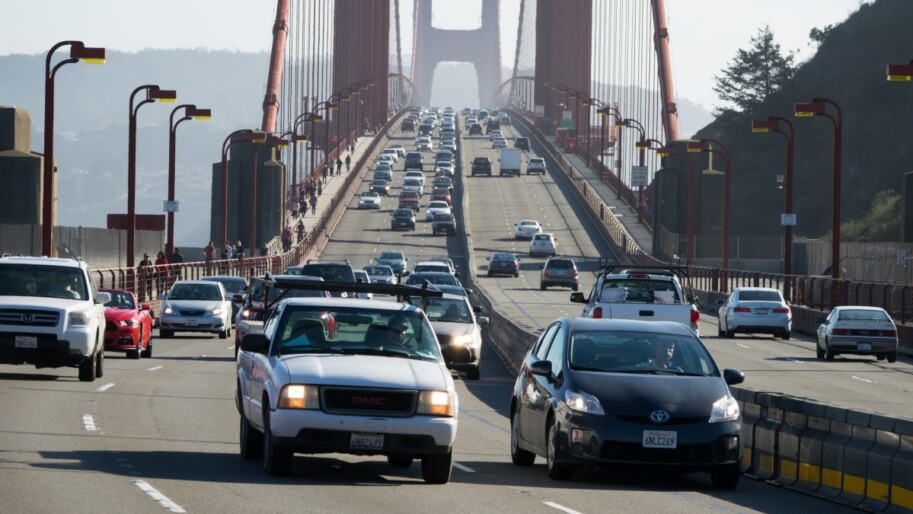SANTA ROSA, California, November 8, 2021 — As world leaders gather in Glasgow for COP26, a new report by The Climate Center finds that the Bay Area’s greenhouse gas (GHG) emissions are not decreasing fast enough. Emissions dropped 3.6 percent between 2014 and 2019 across the Bay Area, well short of the pace Bay Area counties would need to meet in order to avert the worst impacts of the climate crisis.
According to recent scientific analysis, California must reduce its emissions by 7.7 percent every year between 2020 and 2030 to stay on track with the Paris Agreement goal of limiting global warming to 1.5 degrees Celsius. The Bay Area is yet to approach that target, coming closest between 2017 and 2018, when emissions decreased by 3.3 percent.
“We’ve seen signs of climate progress in the Bay Area, especially from the electricity sector,” said Ellie Cohen, CEO of The Climate Center. “But we are still falling far short of what is needed. The climate crisis demands that we act with unprecedented ambition to avoid the worsening droughts, wildfires, and instability that come with a warming planet.”
The electricity sector showed the most significant progress, reducing its emissions by 52 percent between 2014 and 2019. This drop is largely due to more Community Choice Agencies coming online with lower-carbon electricity, a low-carbon PG&E electricity supply in 2019 (which itself was driven by Community Choice influence), and a more recent increase in hydroelectric power.
Emissions in the transportation sector, however, show a worrying rise of almost 19 percent. Transportation is the state’s leading source of emissions and has proven a challenging sector to decarbonize. Emissions from natural gas also grew by 8.9 percent; natural gas now has a larger footprint than the electricity sector in the Bay Area. Emissions from solid waste grew 25.8 percent, due in large part to increased disposal of debris from wildfires.
All told, the increases in transportation, natural gas, and solid waste emissions almost entirely offset the gains made in the electricity sector.
Jock Gilchrist, Research and Initiative Manager at The Climate Center and lead author on the report, said, “The slow pace of change in the Bay Area underscores the need for forward-thinking policymaking at the local, state, and federal levels. Smart climate policy, like we propose in our Climate-Safe California campaign, doesn’t just help the environment. It creates jobs, improves air and water quality, and protects public health, especially for communities on the frontlines of climate impacts.”
Overshadowing the region and state’s climate goals is the increasing prevalence of large wildfires. According to the California Air Resources Board, the 2020 wildfire season emitted an additional 110 million metric tons of carbon dioxide, over a quarter of the state’s total emissions footprint.
The report also shows that the Bay Area’s emissions shrunk at a slower pace than those of both California and the nation overall, which reduced emissions by 5.6 percent and 3.9 percent over the same time period.
The new report from The Climate Center is the most up-to-date effort to evaluate the Bay Area’s climate progress. It covers the nine Bay Area Counties: Alameda, Contra Costa, Marin, Napa, San Francisco, Sonoma, Solano, San Mateo, and Santa Clara. The Climate Center used publicly available data and a simple, replicable model to assess greenhouse gas trends that cover 70 to 90 percent of the region’s emissions.
ENDS
Notes:
The full report, a summary of key findings, and the raw data for greenhouse gas emissions by sector across the nine Bay Area counties are available here: https://theclimatecenter.org/san-francisco-bay-area-greenhouse-gas-emission-trends-for-2014-2019/
These findings were first reported in the San Francisco Chronicle on November 8, 2021: https://www.sfchronicle.com/bayarea/article/Even-the-Bay-Area-needs-to-reduce-greenhouse-gas-16599798.php
Contact: Ryan Schleeter, Communications Director, The Climate Center
ryan@theclimatecenter.org, 415-342-2386
About The Climate Center:
The Climate Center is a climate and energy policy nonprofit working to rapidly reduce climate pollution at scale, starting in California. Our flagship Climate-Safe California campaign is a unique and comprehensive effort to make California the first state in the nation to reach carbon negative.


